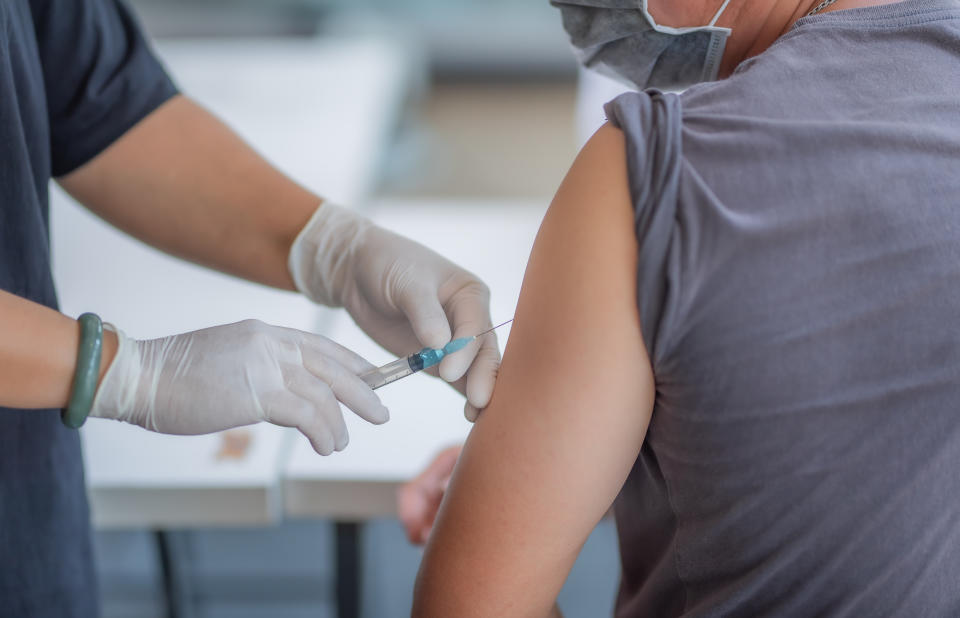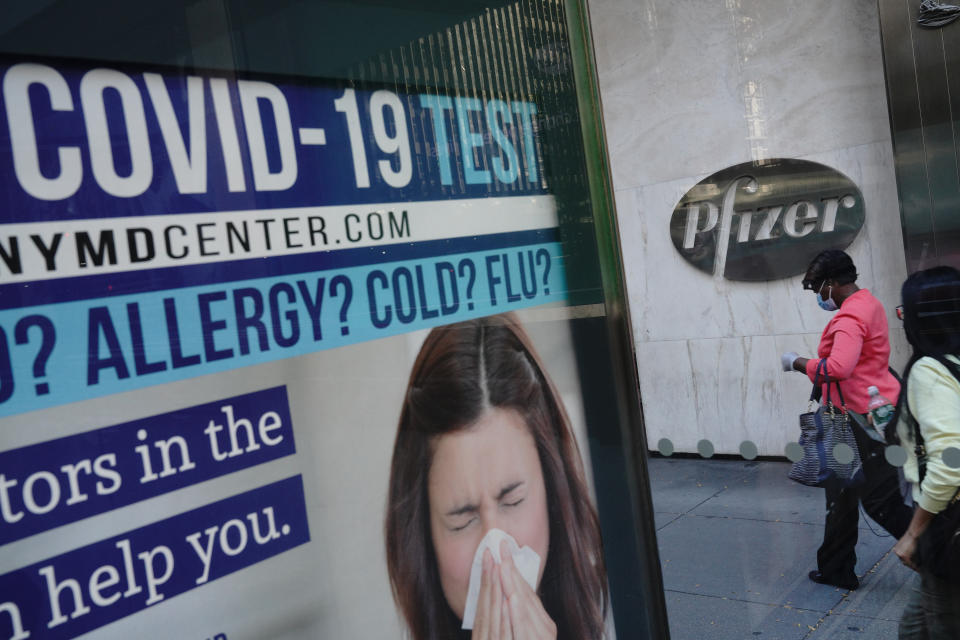When will people in UK get coronavirus vaccine? Here’s everything you need to know
Watch: Matt Hancock says there is a ‘huge’ vaccine rollout plan
The news of the world’s first effective coronavirus vaccine has been welcomed in the UK by politicians, scientists and health experts.
Pharmaceutical giant Pfizer and its German partner BioNTech announced on Monday that their COVID-19 vaccine has been more than 90% effective in a trial of more than 43,000 people.
As a result, one of the government’s top scientists said he was “hopeful” the vaccine could be ready by Christmas, while a member of its vaccine taskforce predicted life may return to normal by spring.
On Tuesday, health secretary Matt Hancock told Sky News he has asked the NHS to be ready to deploy the vaccine from the start of December.
The health service will be supported by the armed forces and vaccination clinics would be open seven days a week, Hancock said.
Here is everything you need to know about the UK’s COVID-19 vaccine:
Who will get the Pfizer/BioNTech vaccine first?
The UK has secured 40 million doses of the Pfizer/BioNTech vaccine – the first agreement the firms signed with any government.
People will need two doses, meaning not enough shots have been secured for the entire UK population.
The Joint Committee on Vaccination and Immunisation (JCVI) has examined data on who suffers the worst outcomes from coronavirus and who is at highest risk of death.
Its interim guidance says that older adults in care homes and care home workers should get priority, followed by those aged 80 and over, and health and social care workers.
Watch: Matt Hancock says vaccine will go to care homes first
Hancock said that once a vaccine becomes available, it will be delivered through care homes, GPs and pharmacists, as well as “go-to” vaccination centres set up in venues such as sports halls.
He added that the vaccine would not be required for children and that uptake would be voluntary.
“We are not proposing to make this compulsory – not least because I think the vast majority of people are going to want to have it,” he said.
How quickly will the vaccine be rolled out?
The military and NHS staff are on standby to roll out the vaccine across the UK from the start of December and will work “seven days a week”, Hancock said.
He said the NHS was leading work to get a vaccine to those most in need as soon as possible, though most people will not get a jab until 2021.
He told Sky News: “I’ve asked the NHS who are supported by the armed services in this – but the NHS very much leading this effort for deploying the vaccine – I’ve asked them to be ready from the start of December.”

Hancock said his “central expectation” is that the mass rollout of a coronavirus vaccine would take place in the first part of 2021.
He told BBC Radio 4’s Today programme that it was possible that some doses of the vaccine could become available before Christmas.
Hancock said the government will provide £150m to support GPs in the rollout of a coronavirus vaccine.
“We will be working across the NHS with the support of the armed forces seven days a week, over weekends, over bank holidays, to get this rolled out into people’s arms as quickly as possible,” he told BBC Breakfast.
On Monday, the deputy chief medical officer for England, Professor Jonathan Van-Tam, said he was “hopeful” the first coronavirus vaccine could be seen by Christmas.
How many COVID vaccines are there?
There are more than 200 coronavirus vaccine candidates being tested around the world.
About 12 of them are in the final stages of testing, but Pfizer is the first to report any results.
The two frontrunners in the COVID-19 vaccine race are the one from Pfizer, called BNT162b2, and another being developed by the University of Oxford and AstraZeneca, which is also in phase three clinical trials.
More than 20,000 volunteers are now taking part in trials for the Oxford vaccine, in countries including the UK, South Africa, Brazil and Kenya.
Oxford University and AstraZeneca are expected to release results of their vaccine shortly.
Hancock said: “The Pfizer vaccine needs to be held at minus 70C until the last few hours before it is deployed, which obviously makes things more complicated.

“The AstraZeneca vaccine is a bit easier to deploy logistically.”
Hancock said the 40 million doses of the vaccine the government had secured from Pfizer will be enough to roll it out to 20 million people.
The government expects 10 million of these doses to arrive in the UK before the end of this year, with people given two doses, 21 days apart.
He told Sky News that the government had invested in six different vaccines to make sure there will be enough for everyone who needs it.
“We have secured 40 million doses in total of the Pfizer vaccine and that means we can roll it out to 20 million people because it requires two doses per person,” Hancock added.
“This is why we have been buying across the board.”
Is the vaccine safe? Are there any side effects?
All vaccines undergo rigorous testing and have oversight from experienced regulators.
Pfizer’s is known as a messenger RNA (mRNA) vaccine.
Conventional vaccines are produced using weakened forms of the virus, but mRNAs use only the virus’s genetic code.
They work by telling cells in the body to create antigens, which are recognised by the immune system and prepare it to fight coronavirus.

Some believe mRNA vaccines are safer for the patient as they do not rely on any element of the virus being injected into the body.
Pfizer and BioNTech have reported no serious side effects from the vaccine, although some participants experienced aches and fevers in early trial phases.
Does the vaccine mean lockdown could end soon?
Hancock urged people not to drop their guard around social distancing, saying coronavirus is “still a deadly disease”.
He told Sky News he was “not going to put a date on” when life may get back to normal after Sir John Bell, regius professor of medicine at Oxford University and a member of the government’s vaccine taskforce, said he was confident people could look forward to a return to normal life by the spring.
“This is promising news, but it is one step of many that we need to take to get out of this and to tackle this pandemic once and for all,” Hancock said.
“We want to get life back to normal as quickly as possible.

“I am not going to put a date on it because there are so many steps we need to go through.”
On Monday, when asked on BBC Radio 4’s The World At One if life will return to normal by spring, Sir John said: “Yes, yes, yes, yes.
“I am probably the first guy to say that but I will say that with some confidence.”
David Nabarro, co-director of Imperial College London’s Institute of Global Health Innovation, said: “Even if a vaccine arrives in the near future we’ve got many months of still dealing with the virus as a constant threat that we’ve got to make certain that we continue to do all that is necessary to solve the virus causing major problems.”
Coronavirus: what happened today
Click here to sign up to the latest news and information with our daily Catch-up newsletter

 Yahoo News
Yahoo News 

